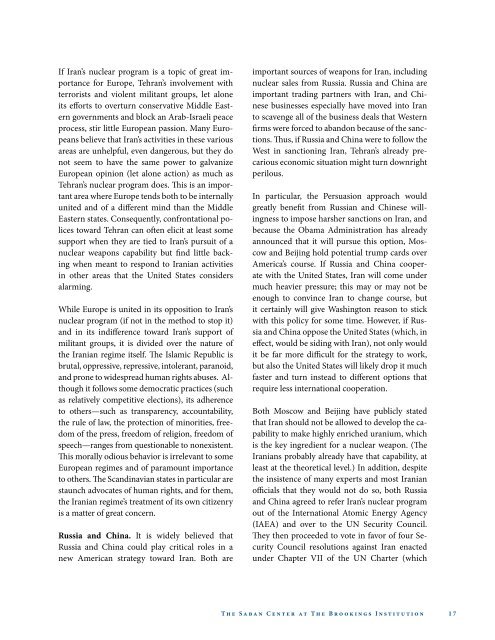WHICH PATH TO PERSIA?
Create successful ePaper yourself
Turn your PDF publications into a flip-book with our unique Google optimized e-Paper software.
If Iran’s nuclear program is a topic of great importance<br />
for Europe, Tehran’s involvement with<br />
terrorists and violent militant groups, let alone<br />
its efforts to overturn conservative Middle Eastern<br />
governments and block an Arab-Israeli peace<br />
process, stir little European passion. Many Europeans<br />
believe that Iran’s activities in these various<br />
areas are unhelpful, even dangerous, but they do<br />
not seem to have the same power to galvanize<br />
European opinion (let alone action) as much as<br />
Tehran’s nuclear program does. This is an important<br />
area where Europe tends both to be internally<br />
united and of a different mind than the Middle<br />
Eastern states. Consequently, confrontational polices<br />
toward Tehran can often elicit at least some<br />
support when they are tied to Iran’s pursuit of a<br />
nuclear weapons capability but find little backing<br />
when meant to respond to Iranian activities<br />
in other areas that the United States considers<br />
alarming.<br />
While Europe is united in its opposition to Iran’s<br />
nuclear program (if not in the method to stop it)<br />
and in its indifference toward Iran’s support of<br />
militant groups, it is divided over the nature of<br />
the Iranian regime itself. The Islamic Republic is<br />
brutal, oppressive, repressive, intolerant, paranoid,<br />
and prone to widespread human rights abuses. Although<br />
it follows some democratic practices (such<br />
as relatively competitive elections), its adherence<br />
to others—such as transparency, accountability,<br />
the rule of law, the protection of minorities, freedom<br />
of the press, freedom of religion, freedom of<br />
speech—ranges from questionable to nonexistent.<br />
This morally odious behavior is irrelevant to some<br />
European regimes and of paramount importance<br />
to others. The Scandinavian states in particular are<br />
staunch advocates of human rights, and for them,<br />
the Iranian regime’s treatment of its own citizenry<br />
is a matter of great concern.<br />
Russia and China. It is widely believed that<br />
Russia and China could play critical roles in a<br />
new American strategy toward Iran. Both are<br />
important sources of weapons for Iran, including<br />
nuclear sales from Russia. Russia and China are<br />
important trading partners with Iran, and Chinese<br />
businesses especially have moved into Iran<br />
to scavenge all of the business deals that Western<br />
firms were forced to abandon because of the sanctions.<br />
Thus, if Russia and China were to follow the<br />
West in sanctioning Iran, Tehran’s already precarious<br />
economic situation might turn downright<br />
perilous.<br />
In particular, the Persuasion approach would<br />
greatly benefit from Russian and Chinese willingness<br />
to impose harsher sanctions on Iran, and<br />
because the Obama Administration has already<br />
announced that it will pursue this option, Moscow<br />
and Beijing hold potential trump cards over<br />
America’s course. If Russia and China cooperate<br />
with the United States, Iran will come under<br />
much heavier pressure; this may or may not be<br />
enough to convince Iran to change course, but<br />
it certainly will give Washington reason to stick<br />
with this policy for some time. However, if Russia<br />
and China oppose the United States (which, in<br />
effect, would be siding with Iran), not only would<br />
it be far more difficult for the strategy to work,<br />
but also the United States will likely drop it much<br />
faster and turn instead to different options that<br />
require less international cooperation.<br />
Both Moscow and Beijing have publicly stated<br />
that Iran should not be allowed to develop the capability<br />
to make highly enriched uranium, which<br />
is the key ingredient for a nuclear weapon. (The<br />
Iranians probably already have that capability, at<br />
least at the theoretical level.) In addition, despite<br />
the insistence of many experts and most Iranian<br />
officials that they would not do so, both Russia<br />
and China agreed to refer Iran’s nuclear program<br />
out of the International Atomic Energy Agency<br />
(IAEA) and over to the UN Security Council.<br />
They then proceeded to vote in favor of four Security<br />
Council resolutions against Iran enacted<br />
under Chapter VII of the UN Charter (which<br />
T h e S a b a n C e n t e r a t T h e B r o o k i n g s I n s t i t u t i o n 1 7

















